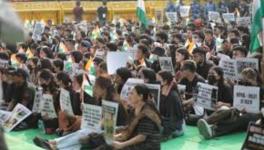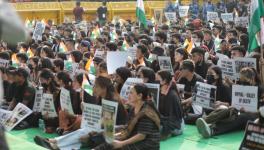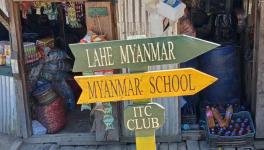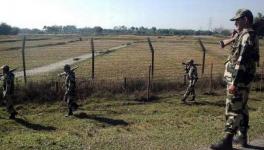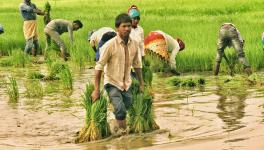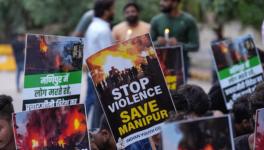Manipur saw breakdown of legal, judicial, constitutional mechanisms: Independent Tribunal
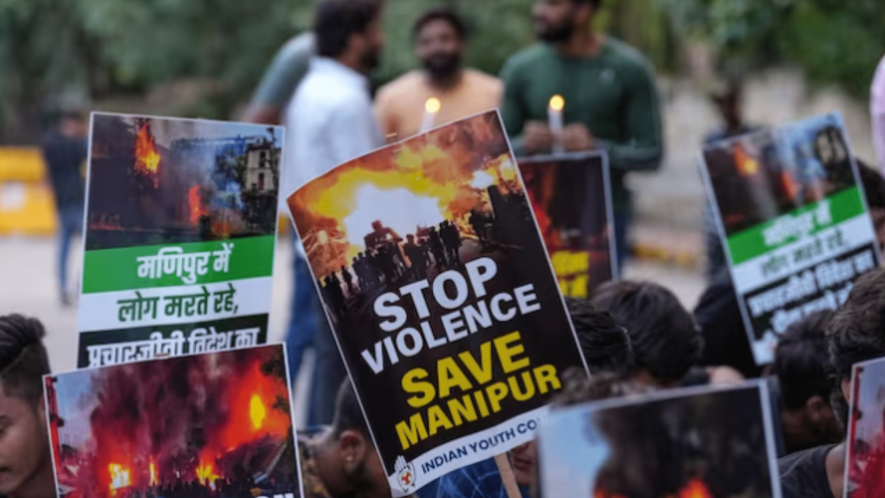
A candle march to pay tribute to those killed in Manipur violence, at Jantar Mantar in New Delhi. File photo: PTI
Kolkata: ‘The Independent People’s Tribunal on the Ongoing Ethnic Conflict in Manipur’, constituted by the People’s Union for Civil Liberties (PUCL) in 2024, has observed in its report released on August 20 that Manipur witnessed a complete breakdown of legal, judicial and constitutional mechanisms for over 27 months since May 3, 2023.
The state and Union governments failed to implement the rule of law and adherence to the Constitution. Former Chief Minister Biren Singh, the police and the bureaucracy failed to ensure accountability at all levels. The pre-existing factors – historical ethnic divisions, socio-political marginalisation and land disputes – got a booster dose from the systematic hate campaign played out through the digital media and statements made by the political leadership in the prelude to the conflict. Digital channels and social media were used to spread unverified and inflammatory content. The print media was partisan and lacked “investigative rigour”, the report said.
The Manipur High Court’s directive, recommending ST (Scheduled Tribe) status for the Meiteis, served as a trigger. The tribal groups – Kuki-Zos and the Nagas – perceived the recommendation as a threat to their constitutional protections. Protests engulfed all tribal/hill districts on May 3, 2023. Though protests ended peacefully, yet violence erupted soon thereafter. Initially, a few places were in the grip of violence but within a short time it spread to the whole state like wild fire.
Former Supreme Court judge Kurian Joseph headed the widely representative independent tribunal which had as members other former judges, ex-IAS officers, an ex-IPS officer, an advocate, academics, a social scientist, a feminist historian, activists and a journalist. Considering the ethno-social nature of the conflict, the organisers of the fact-finding mission decided against having members from Manipur in the team.
The team visited the state’s conflict-affected areas and held sittings in several districts including Bishnupur, Churachandpur, Imphal East, Imphal West, Kakching, Kangpokpi and Senapati. Members also visited a number of relief camps and met with various government functionaries and security officials. The tribunal heard testimonies of internally displaced persons (IDPs) and representatives of different ethnic communities – Kukis, Meiteis, Nagas, Pangals and others. It met intellectuals, political leaders, law and health professionals and journalists. The exercise in Manipur was followed up with sittings in Delhi to record testimonies and receive submissions, virtual versions of which were also accepted.
The jury was presented with a stream of narratives that dominated the discourse around the conflict. The Meitei deponents harped on the continuous immigration of Kuki-Zo communities from Myanmar, However, it was found by the jury from a study of data “that the allegation of population influx raised by Meiteis and propagated by the political leadership holds little ground”.
Another contending narrative was the involvement of the Kukis in poppy cultivation, in line with then chief minister Biren Singh’s ‘war on drugs’, which translated into popular propaganda against the Kukis. This was strongly countered by the Kuki deponents as a conspiracy to demonise them, “when in fact the key players came from different communities, specially those who occupied key positions in government”.
After an assessment of the testimonies, depositions, talks with victims’ family members and photographic evidences, the jury had no doubt about the “brutality of violence in which people were killed, butchered, tortured, dismembered, disrobed, sexually assaulted in public and then through social media displayed …”
The report documents widespread sexual violence during the conflict which occurred both in the Valley and in the Hills. Many incidents of sexual violence were not reported due to fear, trauma and lack of institutional support. Even when women sought protection from the police and security forces, they were refused help. Moreover, there were instances when the police handed them over to violent mobs. Due to complete loss of trust in the state machinery, women survivors instead of reaching out to police stations, sought protection from their communities.
Relief and rehabilitation measures were grossly inadequate, delayed and unevenly distributed. There was total absence of mental health support systems. The already fragile healthcare system crumbled as hospitals and clinics were attacked, medical supplies looted and ambulances destroyed. There was total breakdown in referral networks as transport infrastructure collapsed. Exacerbating the situation was grossly inadequate nutrition in relief camps started for IDPs. The worst victims were women, children, elderly persons and those differently-abled.
Recommendations
For rebuilding trust, democracy and co-existence in Manipur, accountability and justice deserve the highest priority. The report calls upon the judiciary, Parliament and civil society to reclaim this duty and see that Manipur does not become a template for future impunity. For ensuring access to justice for all, a permanent bench of the Manipur High Court needs to be established for the Hills.
A Special Investigating team (SIT) should be appointed by the Supreme Court, with senior officers from states other than Manipur, to investigate the role of the armed forces and other security agencies. SIT should report to the Supreme Court every month. Hate speeches should be probed in depth. Perpetrators, including political figures and state functionaries, should be prosecuted.
A series of recommendations have been made to tone up health care facilities in the relief camps for IDPs. These should have within their ambit mental health and psychosocial support. The authorities have been advised to seek help and support from the Tata Institute of Social Sciences and the National Institute of Mental Health and Neurosciences. A significant observation of the jury is that ‘there is great disparity between the quality of life [the] Kukis have, compared to [the] Meiteis in their respective camps ….”
The tribunal members heard unconfirmed reports being in circulation about the conflict being orchestrated by vested interests who would want to destabilise the region so that “the state-corporate nexus could take control of the Hills and the forests to harness (plunder) the natural resources ……”.
Such clandestine geopolitical interventions would be detrimental to the interests of the people of the state. It is important that the state and the Centre come out transparently regarding the corporate business interventions ‘that are being planned in Manipur and beyond.
The Union government must provide dedicated financial packages, recognizing that the conflict has severely impacted Manipur’s primarily agrarian economy and reduced its fiscal capacity.
Meiteis Angry, Kuki-Zos Happy
The Coordinating Committee on Manipur Integrity (COCOMI) has observed that the so-called tribunal report is nothing but a biased, misleading and politically engineered narrative that seeks to vilify the Meitei community while legitimising the separatist aspirations of Chin-Kuki narco-terrorist groups. The contents reflect bias, selective omission and fabrication. It demonises an entire community while shielding the role of narco-terrorist groups. Upon careful review of the report, COCOMI has concluded that the report is deliberately structured to appease separatist agendas. It, therefore, rejects the report.
The Kuki-Zo Council is happy that PUCL has mustered courage to set up an independent tribunal to record the voices of the victims, survivors and stakeholders. At a time when narratives are often distorted or silenced, such third-party fact-finding initiatives provide the nation with an unbiased understanding of the ground reality.
The divide between the Meiteis in the Valley and the Kuki-Zos in the Hills is now undeniable and irreversible. Therefore, New Delhi must act with moral courage and political clarity. The time has come to officially recognize this separation and grant the Kuki-Zo people a separate administration within the Indian Union. That will be the real healing touch for Manipur, KZC has argued.
The writer is a senior freelance journalist based in Kolkata.
Get the latest reports & analysis with people's perspective on Protests, movements & deep analytical videos, discussions of the current affairs in your Telegram app. Subscribe to NewsClick's Telegram channel & get Real-Time updates on stories, as they get published on our website.









